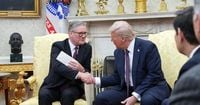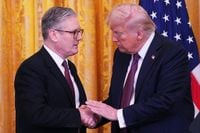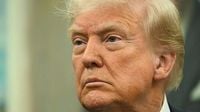On May 8, 2025, President Donald Trump announced a "full and comprehensive" trade deal with the United Kingdom, marking a significant milestone in US-UK relations. The announcement came during a press conference at the White House, where Trump stated, "The agreement with the United Kingdom is a full and comprehensive one that will cement the relationship between the United States and the United Kingdom for many years to come." This deal is particularly notable as it is the first major trade agreement since Trump imposed sweeping tariffs on various countries, including a 10% tariff on all imported goods.
The deal is expected to provide much-needed relief to British industries that have been adversely affected by these tariffs, especially in sectors such as steel, aluminum, and automotive manufacturing. William Bain, head of trade policy at the British Chambers of Commerce (BCC), expressed optimism about the deal, noting that it would be met with a "huge sigh of relief" from many British businesses. Bain emphasized that firms are eager to see a reduction in the 25% tariffs that have significantly impacted their operations.
In the lead-up to the announcement, UK Prime Minister Keir Starmer had made a trade deal with the US a key priority, aiming to mitigate the effects of the tariffs imposed by Trump last month. The tariffs included a general 10% levy on all UK exports and a 25% charge on specific sectors, which had been particularly damaging to British luxury car manufacturers like Rolls-Royce and Aston Martin. Starmer's government has insisted that lowering food standards would remain a red line in any trade negotiations, a point reiterated by Commons Leader Lucy Powell, who noted that agricultural concerns must be addressed.
As the UK and US prepare to solidify this deal, the financial markets have responded positively. The FTSE 100 Index rose 30 points to 8589.3, reflecting a 0.4% increase, while the British pound strengthened slightly against the dollar and the euro. This uptick in market performance came alongside the Bank of England's decision to cut interest rates to 4.25%, the lowest level since May 2023. The rate cut, decided by a narrow majority of the Monetary Policy Committee, indicates an attempt to stimulate economic growth amidst ongoing uncertainties.
Starmer's strategic approach to cultivating a relationship with Trump has been viewed as a political victory, especially given the historical context of previous UK leaders who struggled to secure a trade agreement with the US post-Brexit. The Prime Minister has maintained a cordial rapport with Trump, even inviting him for a potential state visit through a letter from King Charles III. This diplomatic engagement appears to have paid off, as Britain is now the first country to finalize a trade deal with the US after Trump's tariff imposition.
However, the specifics of the agreement are still being clarified, and some analysts caution that it could present challenges for Starmer's government. The deal might complicate efforts to reset trade relations with the European Union, as some observers suggest that the UK may have to choose between aligning with the US or maintaining its commitments to Europe. British farmers, in particular, are keeping a close eye on the negotiations, especially regarding the importation of US agricultural products, which could potentially undercut local markets.
In a statement, Downing Street emphasized the importance of a trade deal that serves the British national interest, asserting that the government would not compromise on food standards. The Prime Minister's spokesperson remarked, "We have always been clear on our red line when it comes to food standards. We are not going to lower British food standards. That’s something set out in the manifesto." This stance highlights the government's commitment to protecting local agriculture while navigating the complexities of international trade.
As the announcement unfolds, attention will also be directed towards the potential economic implications of the trade deal. Economists have warned that the tariffs could lead to shortages of certain goods and increase consumer prices. Trump's aggressive trade strategy has already raised concerns about its impact on the US economy, with Federal Reserve Chair Jerome Powell cautioning that the ongoing tariff policies could exacerbate inflation and unemployment issues.
In summary, the US-UK trade deal represents a pivotal moment in post-Brexit Britain, showcasing the potential for renewed economic ties with the United States. While the agreement is seen as a step forward, it also poses challenges that will require careful navigation by Starmer's administration. As the details of the deal emerge, both sides will need to address the concerns of various stakeholders to ensure a mutually beneficial outcome that reinforces the long-standing relationship between the two nations.






